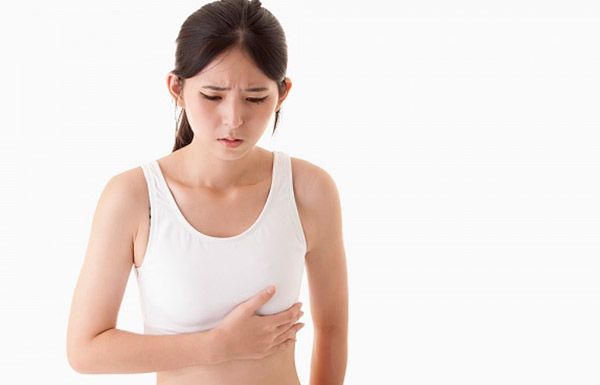Medical expert of the article
New publications
Mammary glands before menstruation
Last reviewed: 23.04.2024

All iLive content is medically reviewed or fact checked to ensure as much factual accuracy as possible.
We have strict sourcing guidelines and only link to reputable media sites, academic research institutions and, whenever possible, medically peer reviewed studies. Note that the numbers in parentheses ([1], [2], etc.) are clickable links to these studies.
If you feel that any of our content is inaccurate, out-of-date, or otherwise questionable, please select it and press Ctrl + Enter.
Causes of the pain in the mammary glands before menstruation
The main reason that mammary glands before menstruation behave differently than usual, is a cyclically repeated increase and decrease in the level of estrogen, progesterone and other steroid hormones that "control" the reproductive system of the woman, of which the breast glands (glandula mammaria) are part.
In a schematic form, this process looks something like this. Monthly, under the action of the pituitary gland produced by the pituitary hormone, follicles in the ovaries ripen, carrying ovules (this phase of the cycle is called follicular). Next, during ovulation, the follicle bursts, releasing "ready for fertilization" egg. In this case, the female body - with the help of the complex neurohormonal mechanism laid by nature - is preparing for the fact that as a result of the fertilization of an egg, pregnancy may occur. And preparation for a hypothetical pregnancy (luteal phase) is not only in the uterus, where there are structural changes in the endometrium (the mucous membrane of the uterine cavity), but also in the mammary glands.
What happens with the mammary glands before menstruation? We divide this question into two parts and find out: firstly, why most women feel swelling of the mammary glands before menstruation. And, secondly, what explains the more or less pronounced pain in the mammary glands before menstruation.
Symptoms of the pain in the mammary glands before menstruation
Breast engorgement before menstruation is normal
Breast engorgement before menstruation - a clear sign of PMS - develops the consequence of the fact that before menstruation produces more estradiol, estrogen, progesterone and prolactin.
Estrogen and its variety of estradiol (synthesized by the ovaries and adrenal cortex) contribute to the development of the stroma (connective tissue) and the proliferation of the alveolar epithelium of the ducts in the parenchyma of the mammary glands.
The task of progesterone (the hormone of the ovary's yellow body) is preparation for breastfeeding by increasing the volume of the glandular tissue, expanding the lactate alveolar ducts embedded in it and forming the acini (alveoli), which are concentrated in individual parts of the mammary layer of the parenchyma.
A hormone of prolactin, the synthesis of which in the pituitary gland shortly before ovulation significantly increases (under the action of the same estrogen), works to increase the number of lobules and ducts in the glands. And here it is necessary to emphasize one more important factor. The fact is that the prolactin-producing lactotrophic cells of the pituitary gland can simultaneously synthesize the growth hormone related to it in structure and some functions, growth hormone and the proliferin hormone, which controls the multiplication of connective tissue cells. So they too can influence the described processes.
Although, as noted by mammology, the increase or swelling of the mammary glands before menstruation - the result of their expansion due to an increase in the volume of glandular cells and swelling of the alveolar courses and alveoli.
Pain in the mammary glands before menstruation: is there any cause for concern?
Pain in the mammary glands before menstruation or mastalgia worries many women.
The innervation of the mammary glands is very developed and is provided by the cervical and brachial plexuses of the supraclavicular nerve and by several branches of the intercostal nerves, from which the lateral branches of the cutaneous nerves are connected, connected with the receptors. Therefore, the mammary glands are very sensitive to pain.

All the processes taking place in the tissues of individual structures of the mammary glands cause an increase in intracellular pressure and lead to edema, stagnation of blood in the veins and lymph in the capillary lymphatic network. This is immediately reacted by the nerve receptors, and, in the end, there is an increased soreness in the chest.
Gynecologists and mammologists warn that against a background of physiological changes in the mammary glands before men often women do not notice or, even worse, do not pay attention to the symptoms of possible pathologies in the form of diffuse mastopathy or fibrous formations.
Therefore, if the soreness of the mammary glands before the month is much more intense and prolonged than it should be, and when the woman feels pain not only in the chest, but also in the armpit, shoulder and even shoulder blade, do not delay the visit to the doctor for a long time.


 [
[